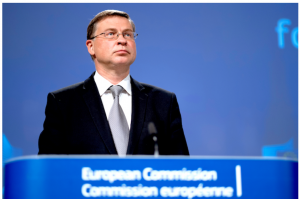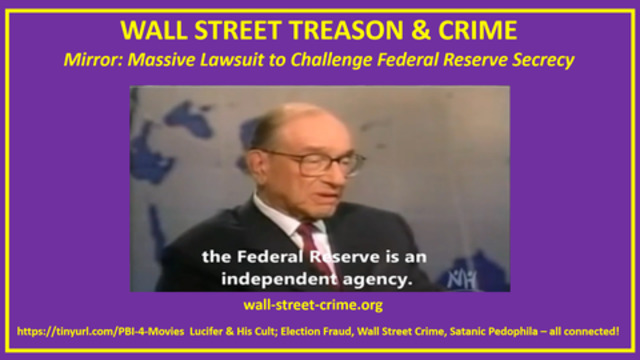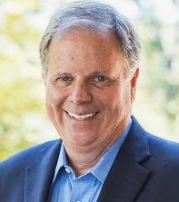Swiss franc climbs after US adds it to ‘manipulation’ watchlist
Sam Jones in Zurich and Eva Szalay in London , 15 January 2020
The Swiss franc nudged up to a near three-year high against the euro on Tuesday as markets anticipated the move would limit the Swiss National Bank’s appetite for aggressive action to try to hold down its currency in future.
“The report is a warning shot to the SNB,” said George Saravelos, global co-head of currency research at Deutsche Bank, adding that the franc is likely to push higher from here. It now trades around CHF1.08 against the euro.
The US called on Bern on Monday to “more forcefully support domestic economic activity” by spending money and reducing the country’s already low tax burden, in what was an unusual swipe at a sovereign nation’s financial affairs. “Despite borrowing costs for the Swiss government being among the lowest in the world, fiscal policy remains underutilised, even within the constraints of Switzerland’s existing fiscal rules,” the US Treasury said in its assessment.
The SNB said on Tuesday that its interventions were transparent, and “motivated purely by monetary policy . . . aimed at addressing the negative consequence for inflation and the economy through a highly valued franc.”
“They are not aimed at giving Switzerland advantages by undervaluing the Swiss franc,” it added.
Read Full Article
 EU policymakers proposed a new agency on Tuesday to stop financial firms from aiding criminals and terrorists after a scandal at a Danish bank highlighted the inadequacy of the bloc’s defences.
EU policymakers proposed a new agency on Tuesday to stop financial firms from aiding criminals and terrorists after a scandal at a Danish bank highlighted the inadequacy of the bloc’s defences.
 LONDON, July 8 (Reuters) – The European Union will propose a new agency to crack down on money laundering and new transparency rules for transfers of crypto-assets, EU documents showed on Wednesday as the bloc responds to calls for tougher action to fight dirty money.
LONDON, July 8 (Reuters) – The European Union will propose a new agency to crack down on money laundering and new transparency rules for transfers of crypto-assets, EU documents showed on Wednesday as the bloc responds to calls for tougher action to fight dirty money. Tycoon Sanjeev Gupta’s commodities empire is being investigated by Britain’s Serious Fraud Office in a probe that encompasses the conglomerate’s links to collapsed lender Greensill Capital, the SFO said on Friday.
Tycoon Sanjeev Gupta’s commodities empire is being investigated by Britain’s Serious Fraud Office in a probe that encompasses the conglomerate’s links to collapsed lender Greensill Capital, the SFO said on Friday. Britain will crack down on online scams and make platforms that make money from advertising financial products more accountable, financial services minister John Glen said on Wednesday.
Britain will crack down on online scams and make platforms that make money from advertising financial products more accountable, financial services minister John Glen said on Wednesday.
 Paul Tudor Jones is an American hedge fund manager, conservationist and philanthropist. In 1980, he founded his hedge fund, Tudor Investment Corporation, an asset management firm headquartered in Stamford, Connecticut. At 24 years old Jones became a commodities broker for E. F. Hutton & Co. In October 2012, it was announced that Glenn Dubin, Paul Tudor Jones and Timothy Barakett were among a group of investors buying the merchant energy operation Louis Dreyfus Highbridge Energy (“LDH Energy”) from Louis Dreyfus Company and Highbridge Capital Management, a New York-based hedge fund. The new company was named Castleton Commodities International, LLC. Jones earned a bachelor’s degree in economics from the University of Virginia.
Paul Tudor Jones is an American hedge fund manager, conservationist and philanthropist. In 1980, he founded his hedge fund, Tudor Investment Corporation, an asset management firm headquartered in Stamford, Connecticut. At 24 years old Jones became a commodities broker for E. F. Hutton & Co. In October 2012, it was announced that Glenn Dubin, Paul Tudor Jones and Timothy Barakett were among a group of investors buying the merchant energy operation Louis Dreyfus Highbridge Energy (“LDH Energy”) from Louis Dreyfus Company and Highbridge Capital Management, a New York-based hedge fund. The new company was named Castleton Commodities International, LLC. Jones earned a bachelor’s degree in economics from the University of Virginia. U.S Senator Doug Jones (D-AL) is a minority member of the US Senate Committee on Banking. After graduating from Cumberland School of Law at Samford University, he worked as staff counsel to the U.S. Senate Judiciary Committee for Senator Howell Heflin. Following his stint in Washington, Senator Jones served as an Assistant United States Attorney from 1980-1984. He left government service in 1984 and was in the private practice of law in Birmingham, Alabama, until President Bill Clinton nominated him to the position of United States Attorney for the Northern District of Alabama. He also sits on the Senate Committee on Health, Education, Labor and Pensions, Senate Committee on Armed Services, and Senate Special Committee on Aging.
U.S Senator Doug Jones (D-AL) is a minority member of the US Senate Committee on Banking. After graduating from Cumberland School of Law at Samford University, he worked as staff counsel to the U.S. Senate Judiciary Committee for Senator Howell Heflin. Following his stint in Washington, Senator Jones served as an Assistant United States Attorney from 1980-1984. He left government service in 1984 and was in the private practice of law in Birmingham, Alabama, until President Bill Clinton nominated him to the position of United States Attorney for the Northern District of Alabama. He also sits on the Senate Committee on Health, Education, Labor and Pensions, Senate Committee on Armed Services, and Senate Special Committee on Aging.